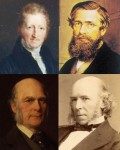Continued review of the history of the science relating to human biology, genetics and race.
Anglican clergyman Thomas Malthus (through An Essay on the Principle of Population) influenced Alfred Russel Wallace as well as Charles Darwin.
Human differences and race were central concerns for early biologists and anthropologists. Debates and disagreements, then and now, regarding the nature of race, including how many races there are, are part of what is called the species problem, which is itself a type of classification problem.
Controversy over the difference between polygenism (which in Darwin’s time was a reflection of the dominant Christian dogma viewing races/species as distinct since creation) and monogenism (reflected, for example, in Darwin’s view that all life is related at some point in the distant past) eventually shifted to disagreement between the multiregional origin of modern humans theory and the recent African origin of modern humans theory (AKA “out of Africa”).
As previously mentioned, Carleton Coon was one prominent proponent of multiregionalism. Coon asserted that the human species divided into five races before it had evolved into Homo sapiens, and furthermore, that the races evolved into Homo sapiens at different times. Coon’s textbook, The Races Of Europe, published in 1939, was a rewrite of William Ripley’s book with the same title, published in 1899. Both men recognized the reality and significance of race not only in the coarse-grained, continental sense, but also in the finer-grained sense, taking note of racial distinctions even amongst Europeans:
Teutonic (Ripley’s term, Coon used the term Nordic) — members of the northern race were long-skulled (or dolichocephalic), tall in stature, and possessed pale hair, eyes and skin.
Mediterranean — members of the southern race were long-skulled (or dolichocephalic), short/medium in stature, and possessed dark hair, eyes and skin.
Alpine — members of the central race were round-skulled (or brachycephalic), stocky in stature, and possessed intermediate hair, eye and skin color.
Discussion moves then to two major, race-related developments which sprang from Darwinism. Francis Galton and eugenics, and Herbert Spencer and what Richard Hofstadter (and others concerned about the best interests of jews) retroactively identified and pathologized as “social Darwinism”.
The podcast will be broadcast and available for download on Tuesday at 9PM ET.
Podcast: Play in new window | Download











Tan,
Good program on the most important subject. I consider eugenics the foundational reason for preserving the best part of the white race, because it is the race which is responsible for 90% of the advances in science. One of my favorite web sites on the subject is eugenics.net .
Without visual aids like maps, etc. this subject can become very confusing. I thought you did very well in getting the information contained in the show across to your audience in a clear and concise manner.